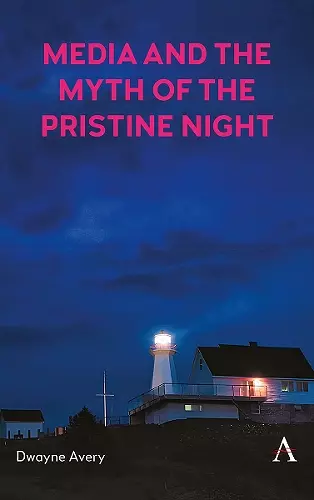Media and the Myth of the Pristine Night
Format:Hardback
Publisher:Anthem Press
Published:4th Nov '25
Should be back in stock very soon

Provides a critical and comprehensive account of the mediation of rural darkness, analyzing a wide range of contemporary media, from astrophotography, tourist advertisements and social media to editing software, online databases and nature documentaries.
This book provides a critical and comprehensive account of the mediation of rural darkness. Analyzing a wide range of contemporary media, from astrophotography, tourist advertisements and social media to editing software, online databases and nature documentaries, the book focuses on two competing and irreconcilable cultures of rural darkness.
With the rapid and ubiquitous spread of urban light pollution, nocturnal darkness has become a rare and neglected experience. In response to the steady decline of gloom, researchers working across multiple disciplines have sought to understand the dynamic and innovative role nighttime plays in human cultures across time. From studies on the ritualistic function of darkened caves in Paleolithic times to contemporary policy concerns over the need for nighttime mayors and tourist economies, night research has emerged as a prolific line of inquiry capturing the night’s distinct qualities. However, while “night studies” brings much-needed attention to human experiences with darkness, little work exists outside the context of cities. The result is that explorations of rural darkness, such as the media genres and styles that culturally shape the meaning of the rural night, have been meager.
This book provides a critical and comprehensive account of the mediation of rural darkness. Analyzing a wide range of contemporary media, from astrophotography, tourist advertisements and social media to editing software, online databases and nature documentaries, the book focuses on two competing and irreconcilable cultures of rural darkness. On the one hand, many media genres contribute to a “preservation” ideology based on the Western myth of “wilderness.” Relying on the classic urban/rural binary, this culture of rural darkness imagines the night as a primal and ancient inheritance, a distant and remote frontier free from the ills of human technology. On the other hand, other media genres challenge this preservationist depiction of rural darkness, demonstrating that the rural night does not retreat from modern, urban life but is an extension of the urban-technological.
Promoting a hybrid, intermeshed view of the night, this culture of rural darkness dismantles the frontier myth by understanding “pristine” darkness as a cultural technology that seeks to erase the messy connections between the rural and the urban. The book contends that only the latter culture of rural darkness offers a responsible and accurate understanding of the rural night. Not...
“This scintillating, lucid account peers through the murk to reveal the convoluted cultural constructions of the rural night. Trenchant critical explorations of manipulated astrophotography, romantic nature documentaries, and the promotion of an astronomical sublime disclose some of the distorted representations of darkness beyond the city. In advancing scholarly thinking about the strange, sensory otherness of the nocturnal rural, Dwayne Avery astutely foregrounds inventive artistic works and time-honored forms of indigenous knowledge and practice.” —Tim Edensor, Professor of Social and Cultural Geography, Manchester Metropolitan University, UK.
“Avery’s insightful book challenges the urban bias in night studies through rich case studies—from dark-sky tourism to the colonized Arctic. Blending method and analysis, it redefines our understanding of nocturnal light and darkness, making it essential reading for scholars, artists, activists, and anyone concerned with the future of night.” —Will Straw, McGill University, Canada.
“Avery’s book provides a much-needed addition to night studies in its specific focus on the rural night. His work provides a friendly critique both of academic attention being overly focused on the night in cities, and of dark sky activism which fails to capture what makes rural darkness important.” —Robert Shaw, School of Geography, Politics and Sociology, Newcastle University, Newcastle upon Tyne, UK.
ISBN: 9781839993985
Dimensions: 229mm x 153mm x 13mm
Weight: 367g
144 pages